Forays into Fantasy: Arabian Fantasy and G. Willow Wilson’s Alif the Unseen
Scott Lazerus is a Professor of Economics at Western State Colorado University in Gunnison, Colorado, and has been a science fiction fan since the 1970s. The Forays into Fantasy series is an exploration of the various threads of fantastic literature that have led to the wide variety of fantasy found today, from the perspective of an SF fan newly exploring the fantasy landscape. FiF examines some of the most interesting landmark books of the past, along with a few of today’s most acclaimed fantasies, building an understanding of the connections between fantasy’s origins, its touchstones, and its many strands of influence.
Editor’s Note: This post counts as a WoGF review for purposes of the December review poll.
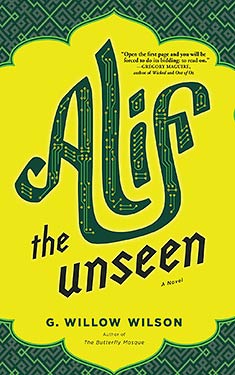 So far, these Forays into Fantasy have mostly ranged from the late nineteenth through the first half of the twentieth century. I’d previously read other seventeenth and eighteenth century fantasies recommended by Moorcock and Cawthorn in Fantasy: The 100 Best Books, a few of which are discussed in this post on the Gothic origins of modern fantasy. My goal for this reading project (along with, hopefully, reading some great books) has been to explore the history of the fantasy genre before beginning to review more modern fantasies, in order to give some historical context to what today’s fantasists are doing. This post will be my first step into the landscape of modern fantasy, with a look at G. Willow Wilson‘s World Fantasy Award-winner Alif the Unseen (2012). A big part of the appeal and originality of this novel is its engagement with current issues in the Middle East. It seems that Wilson, while writing Alif, anticipated the events of the Arab Spring, and the role of computers and social media in those uprisings. But the story also partakes of a fantasy tradition that stretches back to one of the eighteenth century roots of the modern genre—the development of Arabian fantasy subsequent to the appearance of translations of the stories that came to be known as the Arabian Nights. This review may also be the first to make a connection between G. Willow Wilson and L. Ron Hubbard (though I’d love to know if anyone got there before me!).
So far, these Forays into Fantasy have mostly ranged from the late nineteenth through the first half of the twentieth century. I’d previously read other seventeenth and eighteenth century fantasies recommended by Moorcock and Cawthorn in Fantasy: The 100 Best Books, a few of which are discussed in this post on the Gothic origins of modern fantasy. My goal for this reading project (along with, hopefully, reading some great books) has been to explore the history of the fantasy genre before beginning to review more modern fantasies, in order to give some historical context to what today’s fantasists are doing. This post will be my first step into the landscape of modern fantasy, with a look at G. Willow Wilson‘s World Fantasy Award-winner Alif the Unseen (2012). A big part of the appeal and originality of this novel is its engagement with current issues in the Middle East. It seems that Wilson, while writing Alif, anticipated the events of the Arab Spring, and the role of computers and social media in those uprisings. But the story also partakes of a fantasy tradition that stretches back to one of the eighteenth century roots of the modern genre—the development of Arabian fantasy subsequent to the appearance of translations of the stories that came to be known as the Arabian Nights. This review may also be the first to make a connection between G. Willow Wilson and L. Ron Hubbard (though I’d love to know if anyone got there before me!).
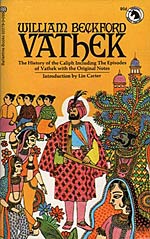 One of the gothic novels recommended by Moorcock and Cawthorn is Vathek, written in French by Englishman William Beckford in 1786, translated into English in 1816. Beckford’s novel is solidly in the gothic tradition, but is unique in its fusing of the gothic with an Arabian setting. Vathek tells the story of a caliph who purposely pursues evil and corruption in order to gain magical talents and power. Its description of Vathek’s ultimate fate makes it one of the darkest works in the gothic tradition. (It’s also one of the shortest of the classic Gothic novels, is astoundingly bizarre and interesting, and I’d recommend it as a good starting point for anyone wanting to sample one of these early fantasies.
One of the gothic novels recommended by Moorcock and Cawthorn is Vathek, written in French by Englishman William Beckford in 1786, translated into English in 1816. Beckford’s novel is solidly in the gothic tradition, but is unique in its fusing of the gothic with an Arabian setting. Vathek tells the story of a caliph who purposely pursues evil and corruption in order to gain magical talents and power. Its description of Vathek’s ultimate fate makes it one of the darkest works in the gothic tradition. (It’s also one of the shortest of the classic Gothic novels, is astoundingly bizarre and interesting, and I’d recommend it as a good starting point for anyone wanting to sample one of these early fantasies.
Beckford’s use of an Arabian setting for a fantasy was part of a trend among French and English writers that began with the publication of the first translation of the Arabian Nights story cycle, various parts of which were published in France between 1704 and 1717, derived from original manuscripts written around three hundred years earlier. These stories, as translated, interpreted (and in some cases probably invented) by Western writers, are set in a fantasy version of Arabia, and subsequent works of Arabian fantasy, whether based directly on the Arabian Nights, or recycling elements fist appearing there (genies being the best known example), should be seen as representing a Westernized vision of an Arabia that exists only as a fantasy landscape, and one that has been more or less popular in the West ever since. The penetration of these stories into our culture is demonstrated by the widespread recognition of characters like Aladdin, Ali Baba, and Sinbad.
 Along with Beckford, eighteenth and nineteenth century English authors making use of Arabian motifs in their stories included Samuel Johnson, Horace Walpole, William Thackeray, and Robert Louis Stevenson. (See this entry by John Clute in the Encyclopedia of Fantasy, from which I’ve sourced much of this information, for more examples.) By the early twentieth century, pulp fantasy writers would also adopt the Arabian setting. In reading through the first half-dozen issues of the John W. Campbell-edited Unknown magazine, I’ve come across two Arabian fantasies by L. Ron Hubbard, who specialized in the Arabian setting. In both stories—“The Ultimate Adventure” (April 1939) and Slaves of Sleep (July 1939)—a meek and mild Western male is magically (or pseudo-scientifically) transported to exotic Arabia, there to undergo many perils and adventures while discovering his inner hero. More Hubbard stories mining the Arabian vein would appear over the short life of the magazine. These stories veer more toward old-fashioned pulp adventure than most Unknown stories, but several of them are still highly regarded, including Slaves of Sleep.
Along with Beckford, eighteenth and nineteenth century English authors making use of Arabian motifs in their stories included Samuel Johnson, Horace Walpole, William Thackeray, and Robert Louis Stevenson. (See this entry by John Clute in the Encyclopedia of Fantasy, from which I’ve sourced much of this information, for more examples.) By the early twentieth century, pulp fantasy writers would also adopt the Arabian setting. In reading through the first half-dozen issues of the John W. Campbell-edited Unknown magazine, I’ve come across two Arabian fantasies by L. Ron Hubbard, who specialized in the Arabian setting. In both stories—“The Ultimate Adventure” (April 1939) and Slaves of Sleep (July 1939)—a meek and mild Western male is magically (or pseudo-scientifically) transported to exotic Arabia, there to undergo many perils and adventures while discovering his inner hero. More Hubbard stories mining the Arabian vein would appear over the short life of the magazine. These stories veer more toward old-fashioned pulp adventure than most Unknown stories, but several of them are still highly regarded, including Slaves of Sleep.
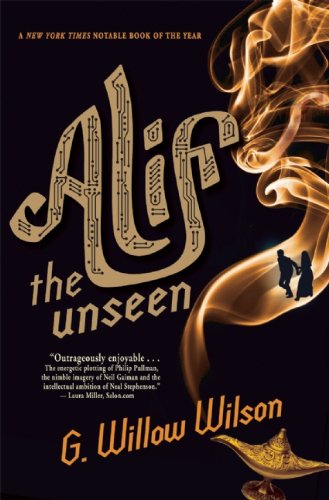 I’ll explore Hubbard’s early fantasies further in a future post, but, strangely enough, these stories came to mind while reading Alif the Unseen. Like Hubbard’s reluctant heroes, Wilson’s protagonist Alif (an internet handle rather than his real name), unintentionally finds his way into a hidden world of magic and jinn, where he is called on to exhibit a bravery he didn’t know he was capable of. It seems unlikely that Wilson was influenced by Hubbard, whose early pulp stories are rarely read today (except maybe by a few Scientologists looking for enlightenment), but the similarities of plot and setting point to the fact that they draw some of their inspiration from the same source, while their differences illustrate how far fantasy has developed over the last three-quarters of a century.
I’ll explore Hubbard’s early fantasies further in a future post, but, strangely enough, these stories came to mind while reading Alif the Unseen. Like Hubbard’s reluctant heroes, Wilson’s protagonist Alif (an internet handle rather than his real name), unintentionally finds his way into a hidden world of magic and jinn, where he is called on to exhibit a bravery he didn’t know he was capable of. It seems unlikely that Wilson was influenced by Hubbard, whose early pulp stories are rarely read today (except maybe by a few Scientologists looking for enlightenment), but the similarities of plot and setting point to the fact that they draw some of their inspiration from the same source, while their differences illustrate how far fantasy has developed over the last three-quarters of a century.
In the context of today’s fantasy, works like Alif the Unseen may stand out for some readers as a result of their departure from what now seems to be the default faux-medieval epic fantasy settings that have been dominant since Tolkien made his mark at mid-century. Reading through the history of pre-Tolkien fantasy, however, it has become clear that today’s movement toward the use of more varied sources and settings, while (rightly) heralded as a step forward in a genre that could benefit from greater diversity, is in some ways a return to an earlier era before fantasy became identified with Tolkien-influenced trilogies and series. After all, if a semi-hack pulp writer like L. Ron Hubbard was using Arabian settings in 1939, should we herald G. Willow Wilson for her originality today?
 Well, yes, actually, because in the current context, it does seem original, and Wilson’s use of the Arabian material is much more nuanced than Hubbard’s. And the real originality derives from her ability to mesh the fantasy setting with the reality of today’s Arab world. Unlike Hubbard, who sent Americans or Englishmen into the Arabian Nights setting, Wilson sends the residents of an unnamed monarchical oil-rich Emirate in the Middle East (along with an American Muslim convert) into an unseen world consistent with their religious teachings. This unseen world exists parallel (or maybe sideways) to our own reality, and is populated by five varieties of jinn. It may be glimpsed by those with spiritual proclivities, but the ability of people to move back and forth between these worlds has deteriorated over the last few centuries. From her perspective as a cultural outsider who now lives in the Middle East and has become a Muslim convert (she discusses this perspective in an interview that appears as an appendix to the book), Wilson questions how some of her more hardline co-religionists can, while insisting on what they see as literal readings of their holy texts, refuse any longer to believe in the reality of the jinn, who are described in these same texts. Wilson’s descriptions of the jinn are consistent with the Qur’an, which describes them as spiritual beings created by God from fire, humans having been created from clay.
Well, yes, actually, because in the current context, it does seem original, and Wilson’s use of the Arabian material is much more nuanced than Hubbard’s. And the real originality derives from her ability to mesh the fantasy setting with the reality of today’s Arab world. Unlike Hubbard, who sent Americans or Englishmen into the Arabian Nights setting, Wilson sends the residents of an unnamed monarchical oil-rich Emirate in the Middle East (along with an American Muslim convert) into an unseen world consistent with their religious teachings. This unseen world exists parallel (or maybe sideways) to our own reality, and is populated by five varieties of jinn. It may be glimpsed by those with spiritual proclivities, but the ability of people to move back and forth between these worlds has deteriorated over the last few centuries. From her perspective as a cultural outsider who now lives in the Middle East and has become a Muslim convert (she discusses this perspective in an interview that appears as an appendix to the book), Wilson questions how some of her more hardline co-religionists can, while insisting on what they see as literal readings of their holy texts, refuse any longer to believe in the reality of the jinn, who are described in these same texts. Wilson’s descriptions of the jinn are consistent with the Qur’an, which describes them as spiritual beings created by God from fire, humans having been created from clay.
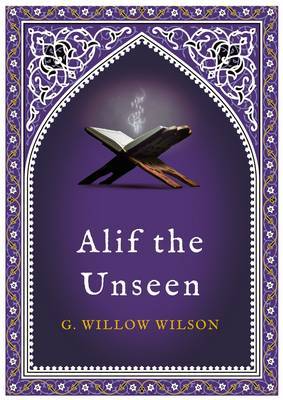 Alif, a talented young computer hacker who sells his computer security talents to groups attempting to remain hidden from government surveillance on the internet, becomes aware of this unseen world after coming into possession of a book of jinn fables (a sort of jinn version of the Arabian Nights called the Alf Yeom), at the same time that government security agents learn his identity and come after him. While on the run with his neighbor and childhood friend Dina, one of Alif’s fellow hackers advises him to seek out a man known as Vikram the Vampire, an enforcer-for-hire who might be able to protect them, for a price. Vikram takes an interest in Alif, Dina, and the Alf Yeom, while the fugitives begin to realize that Vikram really is a vampire—a vetala jinn who can change shape and reanimate corpses. (Wilson describes the characteristics of the five types of jinn in an afterword to the novel.) Verbally abusive and arrogant, potentially extremely dangerous, but ultimately noble, Vikram dominates every scene he appears in, and is the great character creation of the novel.
Alif, a talented young computer hacker who sells his computer security talents to groups attempting to remain hidden from government surveillance on the internet, becomes aware of this unseen world after coming into possession of a book of jinn fables (a sort of jinn version of the Arabian Nights called the Alf Yeom), at the same time that government security agents learn his identity and come after him. While on the run with his neighbor and childhood friend Dina, one of Alif’s fellow hackers advises him to seek out a man known as Vikram the Vampire, an enforcer-for-hire who might be able to protect them, for a price. Vikram takes an interest in Alif, Dina, and the Alf Yeom, while the fugitives begin to realize that Vikram really is a vampire—a vetala jinn who can change shape and reanimate corpses. (Wilson describes the characteristics of the five types of jinn in an afterword to the novel.) Verbally abusive and arrogant, potentially extremely dangerous, but ultimately noble, Vikram dominates every scene he appears in, and is the great character creation of the novel.
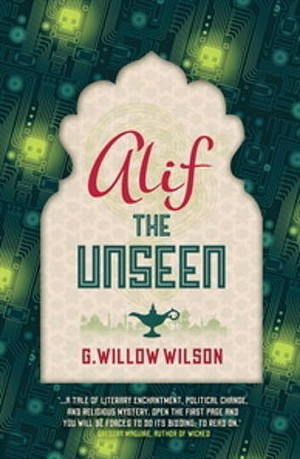 Vikram takes Alif and Dina to meet “the Convert”, an American student who knows something about ancient manuscripts, and who determines the origin and rarity of the Alf Yeom. Alif has determined that “the Hand of God”—head of internet security for the government—is after the Alf Yeom because he thinks he can use its magical stories to develop a new kind of computer code allowing him to control the internet and flush hackers like Alif out of hiding. On the run from the secret police and hiding out in a mosque, Alif manages to use the book himself to create a new program to fight back against the Hand, but even with Vikram’s help, the fugitives can’t stay hidden indefinitely, and it turns out that the Hand has his own allies in the Unseen world.
Vikram takes Alif and Dina to meet “the Convert”, an American student who knows something about ancient manuscripts, and who determines the origin and rarity of the Alf Yeom. Alif has determined that “the Hand of God”—head of internet security for the government—is after the Alf Yeom because he thinks he can use its magical stories to develop a new kind of computer code allowing him to control the internet and flush hackers like Alif out of hiding. On the run from the secret police and hiding out in a mosque, Alif manages to use the book himself to create a new program to fight back against the Hand, but even with Vikram’s help, the fugitives can’t stay hidden indefinitely, and it turns out that the Hand has his own allies in the Unseen world.
Alif the Unseen attempts much, and mostly succeeds. It is a political thriller, a description of political conditions in the Middle East, a coming of age story, a love story, a somewhat philosophical explication of Muslim spirituality, and, as part of the long tradition described above, an Arabian fantasy. While much earlier Arabian fantasy is really a Western creation, Wilson, a Muslim convert, has taken back the genie motif and attempted to return it to its original context. The author’s cultural sensitivity doesn’t get in the way of telling an exciting story, while her use of the original Muslim theology makes the jinn characters much more interesting and varied than they have tended to be in previous incarnations of Arabian fantasy.
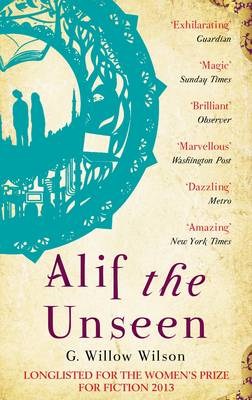 I also found the religious aspects of the book interesting rather than distracting. Wilson creates a sympathetic picture of Muslim theology and, while I’m not qualified to comment on its accuracy, it rings true. As with any religion, Muslim teachings can be hijacked or corrupted by zealots and fundamentalists, and for this the novel provides no justification. The spiritual viewpoint is provided by Sheikh Bilal, head of the mosque where Alif and his friends hide for a time from the police, as well as by Dina, the quiet hero of the novel. Without Dina’s bravery, patience, intelligence, and foresight, she and Alif would not have been able to achieve what they do in the story. Dina’s character can also be seen as a defense of Muslim traditions toward women. Her insistence on maintaining modesty by wearing the hijab (the head- and chest-covering veil), as well as continuing to observe other religious proprieties in even the most trying circumstances, is seen as a sign of the strength of her spirituality and character, counteracting the perception that such customs can only serve the purpose of female repression. Within the context of the novel, Dina is an empowered character, and her growing relationship with Alif, who comes to respect and love her, is another important aspect of the story.
I also found the religious aspects of the book interesting rather than distracting. Wilson creates a sympathetic picture of Muslim theology and, while I’m not qualified to comment on its accuracy, it rings true. As with any religion, Muslim teachings can be hijacked or corrupted by zealots and fundamentalists, and for this the novel provides no justification. The spiritual viewpoint is provided by Sheikh Bilal, head of the mosque where Alif and his friends hide for a time from the police, as well as by Dina, the quiet hero of the novel. Without Dina’s bravery, patience, intelligence, and foresight, she and Alif would not have been able to achieve what they do in the story. Dina’s character can also be seen as a defense of Muslim traditions toward women. Her insistence on maintaining modesty by wearing the hijab (the head- and chest-covering veil), as well as continuing to observe other religious proprieties in even the most trying circumstances, is seen as a sign of the strength of her spirituality and character, counteracting the perception that such customs can only serve the purpose of female repression. Within the context of the novel, Dina is an empowered character, and her growing relationship with Alif, who comes to respect and love her, is another important aspect of the story.
Subtext aside, I wouldn’t want to distract from the fact that Alif the Unseen, not unlike Hubbard’s Slaves of Sleep, is also a fantastic journey through a beautifully described fantasy world full of strange and varied creatures. Unlike Hubbard’s version of the unseen world, however, in Wilson’s version, the jinn have wi-fi.
 One final note: Alif the Unseen is G. Willow Wilson’s first novel, but I put it on my reading list as soon as it was released, since I knew her as the writer of the comics series Air, co-created by artist M. K. Perker, which ran for twenty-four issues from Vertigo Comics between 2008 and 2010. Like Alif, it tells a story of the intersection between events in our world (in particular, it deals with air travel and terrorism), and a related fantasy world. It’s one of my favorite comics series of the last decade, and I would recommend that anyone who enjoyed Alif the Unseen (or who likes good comics) check it out.
One final note: Alif the Unseen is G. Willow Wilson’s first novel, but I put it on my reading list as soon as it was released, since I knew her as the writer of the comics series Air, co-created by artist M. K. Perker, which ran for twenty-four issues from Vertigo Comics between 2008 and 2010. Like Alif, it tells a story of the intersection between events in our world (in particular, it deals with air travel and terrorism), and a related fantasy world. It’s one of my favorite comics series of the last decade, and I would recommend that anyone who enjoyed Alif the Unseen (or who likes good comics) check it out.



















 Full Details
Full Details


No comments yet.
Sorry, the comment form is closed at this time.